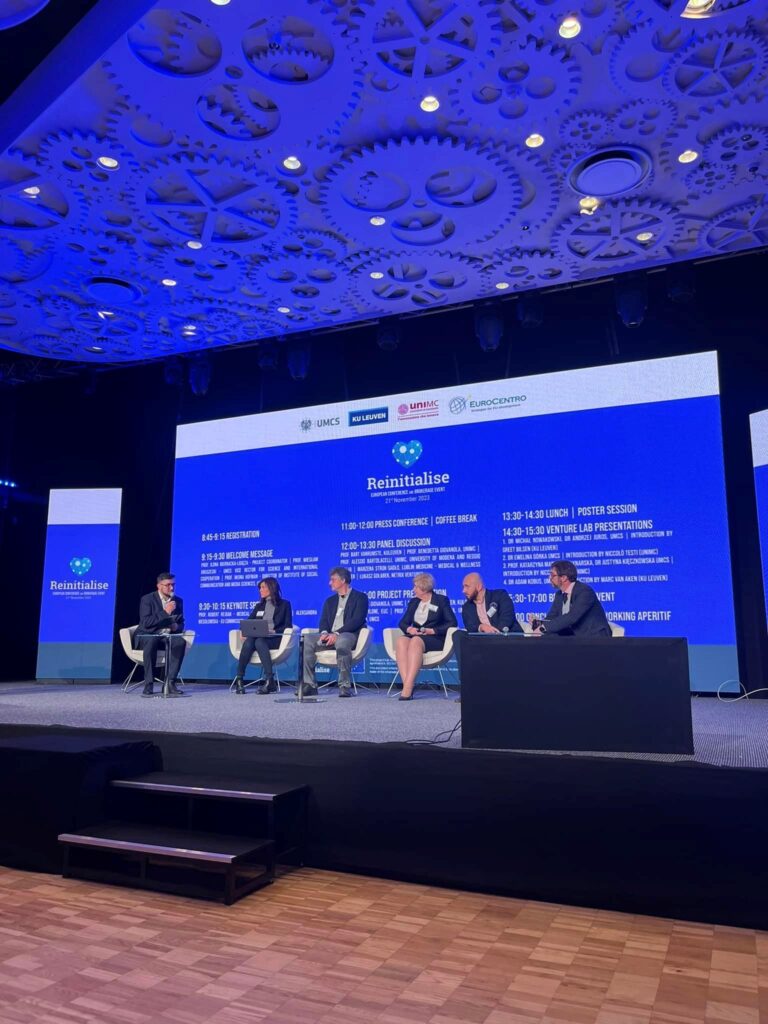
On November 21st 2023 final conference took place in Lublin Conference Center in Lublin (Poland). According to the project, the conference consisted of two parts.
Part I: Fundamental rights and digital tools for e-health services. The partnership presented and shared research, innovation and practices of stakeholders’ involvement related to: a) the interdisciplinary approach needed to develop digital tools in the e-health sector respectful of fundamental rights and; b) the advantages of this approach in terms of businesses’ competitiveness and effective healthcare systems.
Welcome message was given by prof. Wiesław Gruszecki, Vice Rector for Science and International Cooperation UMCS, dr Wojciech Maguś, Vice Director of Institute of Social Communication and Media Sciences UMCS and prof. Ilona Biernacka-Ligięza, Project Coordinator.
During the conference 2 keynote speakers prof. Robert Rejdak (Medical University of Lublin, Poland) and Aleksandra Wesołowska (European Commission) gave a speech about the importance of the topics related to the REINITIALISE project. Next, all Workpages leaders (prof. Benedetta Giovanola, Hannelore Strauven, Claudio Carlone, Ewelina Górka) presented main results of the project, incl. the Joint Research Roadmap in the e-health sector and the UMCS strategy for socio-economic impact in the e-health sector. After a break, there was a panel discussion on e-health development, digitalization in health care: different perspectives and possible threats, use of AI in health care, digital maturity in the health care system. Participants were: prof. Bart Vanrumste (KUL), prof. Benedetta Giovanola (UNIMC), prof. Alessio Bartolacelli (UNIMC, UniMORE), Marzena Strok-Sadło (Lublin Medicine-Medical & Wellness Cluster), Łukasz Gołąbek (Netrix Ventures).
The first results in terms of new ideas for products and services, as emerged from the Venture Lab were presented. There were 4 research lines and groups of researchers:
1. Training on eHealth tools & patient centered support for vulnerable populations (dr Michał Nowakowski, dr Andrzej Juros, Faculty of Philosophy and Sociology / Institute of Sociology UMCS): introduction by Greet Bilsen (KUL).
2. Health-related communication (dr Ewelina Górka, Faculty of Political Science and Journalism / Institute of Social Communication and Media Sciences UMCS): introduction by Niccolò Testi (UNIMC).
3. First Aid in the Digital Era (prof. Katarzyna Marzęda-Młynarska, dr Justyna Kięczkowska, Faculty of Political Science and Journalism / Institute of International Relations UMCS): introduction by Niccolò Testi (UNIMC).
4. Autism, dyslalia and revalidation classification models (dr Adam Kobus, Faculty of Mathematics, Physics and Computer Science / Institute of Computer Science UMCS): introduction by Marc Van Aken (KUL). During the discussion, academia and stakeholder representatives from other relevant projects, R&I networks, etc. were invited to share research, experience and good practices in the related fields to promote cross-fertilization and identification of joint synergies and future cooperation.
Part II: Brokerage Event
The second part of the conference consisted of a brokerage event to concretely support network building and cooperation initiatives between UMCS researchers and other relevant stakeholders. Cooperation profiles of the participating organizations were prepared before the meeting to facilitate the identification of future potential cooperation initiatives or business partners.
During this part of the conference 4 representatives presented short presentations about their institution profile:
– Bona Notitia Foundation (Marcin Stachyra),
– International Media Education Institute (Ilona Dąbrowska),
– World Hearing Centre of the Institute of Physiology and Pathology of Hearing (Anna Błaszczak),
– Girache (Gazela Sadurska).
Participants had possibility to take part in face-to-face meetings, where they could meet and greet at high speed to present and discuss their innovative proposals/ideas/technologies. During the whole event there were also available posters presented the main results of the each scientific papers prepared within the project.
The conference allowed:
a) to make it possible for interested actors to use/exploit part of the results in their own respective work areas;
b) to promote further cooperation, develop synergies, research and innovation networks.
